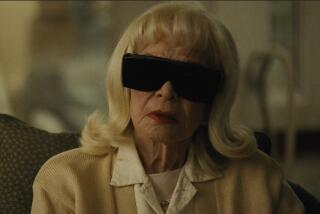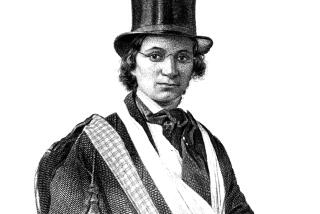The challenge of a lifetime
- Share via
SAN DIEGO — In 1990, Allan Gurganus’ “Oldest Living Confederate Widow Tells All” was published -- a sprawling, 719-page novel including some 25 characters, male and female, old and young, black and white. In 1994, the novel was adapted into a sprawling four-hour CBS miniseries with an all-star cast (Diane Lane, Anne Bancroft, Donald Sutherland, Cicely Tyson) including some 25 characters -- male and female, old and young, black and white.
In 2003, “Oldest Living Confederate Widow” is an approximately two-hour stage play with all 25-odd characters portrayed by one 69-year-old white female: veteran stage and screen actress Ellen Burstyn. The show premiered Saturday at San Diego’s Old Globe Theatre.
Can one performer be all that? A few days after arriving in San Diego and a few days before opening night, Burstyn, nursing a cup of Earl Grey tea in a hotel restaurant not far from the Old Globe, acknowledged with a laugh that she was beginning to wonder that herself.
“It’s quite challenging,” she offers, with massive understatement. “We’ve got a computer here that tells us how many words I’m memorizing. It’s 16,000 words. I say to myself: I am going to be able to do this, right?”
The actress had not been on stage since she portrayed Mary Tyrone in Eugene O’Neill’s “Long Day’s Journey Into Night” at Connecticut’s Hartford Stage in 1999. “I was ready to go back on the stage, and I said to my agent: ‘I want to do a play,’ ” Burstyn says. “She said: ‘What kind of play do you want to do?’ I said: ‘Hard.’
“This may be the hardest thing I’ve ever done. It’s terrifying to be out on that stage alone, when you’re not in relationship to anyone or anything. The whole stage is black, the theater is black, there’s only one light on me, so I’m not even in relationship to a glass, or a teacup, or anything. I’m just totally out there, with 16,000 words.”
It’s even more complicated than it sounds. Technically, Burstyn only plays one character: Lucy Marsden -- widow of the late Confederate army Capt. William Marsden. In the novel, she’s 99, but for the stage adaptation, by Martin Tahse, Burstyn requested the age not be so specific; her character, she says, is simply “very old.”
And as she shares her tales of life from the Civil War to the present, Lucy essentially turns into all of the people who surrounded her during her near-century on Earth, including the captain and Castalia, a former Marsden slave-turned-housekeeper and companion to Lucy. Taking some necessary dramatic license, Burstyn must play the disparate characters while maintaining the flavor of an elderly widow telling her story.
Along with the play’s director, Don Scardino, who had directed Burstyn in “Sacrilege” on Broadway, adapter Tahse was responsible for searching out Burstyn for the role. “We needed a stage actor -- we couldn’t go with a movie actor who’d never been on the stage before. This was really a task,” he said in a separate conversation at the Globe. “And I remember from ‘Alice Doesn’t Live Here Anymore’ that she could do comedy. Even in the blackest scenes, Lucy always has something to say.”
Novelist Gurganus, a native of small-town North Carolina, offers this philosophical take on entrusting his book to Burstyn: “Well, if one person can make it up, you’d think one person can say it,” he says. “I think of it as a solo work for a choir.
“She came to North Carolina for four days, stayed in my house, and I introduced her to the best accents in North Carolina, from aristocratic to working-class to every kind of talk I can get,” Gurganus adds. “It was really fun; it was like Margaret Mead in Samoa doing field work. Who else would come to my little tiny town and spend a week with her camcorder, going from door to door?”
Along with listening to the dialects, Burstyn also studied their history. “When I first got the piece, I was shy to play the black characters, because I didn’t want to stereotype them,” she says. “But Castalia is such a fine, interesting, deep woman, and I got a wonderful coach to help me with the dialect, so now I feel strong as Castalia.”
As part of the training, vocal coach Denise Woods also led Burstyn into linguistic history. “She told me that most of the slaves came from East Africa, and there were certain sounds they didn’t have in their language.
“The history of the sounds helped me understand why people talked the way they did, so I didn’t feel like I was doing an imitation.
“Mrs. Marsden was the plantation; she had 61 slaves, but she was living on a 2,000-acre farm, and there were no white people on the farm,” Burstyn continues. “She had nothing to do, no one to talk to but Castalia. So she played the piano, and knitted, and did jigsaw puzzles and talked to Castalia.
“When the slaves left, she was completely dependent, she didn’t know how to build a fire, or heat water. Castalia has to teach her to take care of herself.”
Burstyn adopted the Islamic religion of Sufism in 1970 because “the universal worship service reads from each of the holy books of the major religions of the world ... you start to hear how the truth lives in each of these books, and the truth is only in the dogma. It’s not like saying: ‘We’ve got the way and nobody else does,’ which seems to be the root of war.”
She is applying the same concept to her one-woman show.
“I think what my profession has taught me is that we have all of these people in us,” she observes. “One of my favorite words is polyphrenia, or the orchestration of the many selves; it’s the opposite of schizophrenia, this sort of split -- this is all of the selves, integrated and orchestrated. This has to be one piece of music.”
*
‘Oldest Living Confederate Widow Tells All’
Where: Old Globe Theatre, Balboa Park, San Diego
When: Tuesdays-Fridays, 8 p.m.; Saturdays, 2 and 8 p.m.; Sundays, 2 and 7 p.m.
Ends: March 8
Price: $19-$50
Contact: (619) 239-2255
More to Read
The biggest entertainment stories
Get our big stories about Hollywood, film, television, music, arts, culture and more right in your inbox as soon as they publish.
You may occasionally receive promotional content from the Los Angeles Times.










